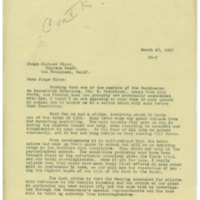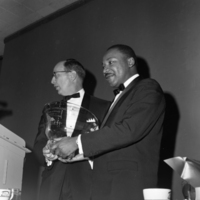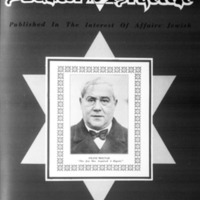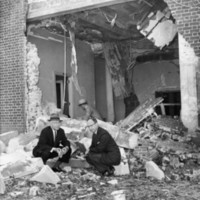Atlanta's Jewish Community
Atlanta, Georgia mayor William Hartsfield (left) and Jacob Rothschild, rabbi of the Hebrew Benevolent Congregation in Atlanta, examining rubble on October 13, 1958, the day after the bombing of the congregation's synagogue, known as "the Temple." Courtesy of the Atlanta Journal-Constitution Photographic Archives. Special Collections and Archives, Georgia State University Library via Digital Library of Georgia.
Leo Frank’s lynching terrorized Georgia’s Jewish communities. Atlanta Jews, who had worked hard to assimilate into Southern society since establishing themselves prior to the Civil War, were now convinced that they were not safe from anti-Semitism. Many withdrew from public life, and Jewish leaders were pressured to appear conciliatory so as not to arouse hostility. No Jewish candidates ran for public office in Atlanta for twenty years; some Jews felt it necessary to leave the South altogether.
By the mid-1940s, Atlanta’s Jewish leaders emerged with more outspoken views. Jacob Rothschild was rabbi at Atlanta’s oldest synagogue, the Hebrew Benevolent Congregation, also known as “the Temple.” Rothschild openly criticized segregation, and publicly supported the civil rights work of Martin Luther King, Jr. His outspokenness was challenged violently when the Temple was bombed by white supremacists in 1958. This time, however, Atlanta rallied to support its Jewish community. Led by Mayor William B. Hartsfield and Atlanta Constitution editor Ralph McGill, Atlantans immediately condemned the incident and campaigned to rebuild the Temple.
During this time, the Southern Israelite, which began as a Temple bulletin, expanded into a monthly newspaper. It ultimately began circulating statewide and throughout the South, and was a leading Jewish publication.






